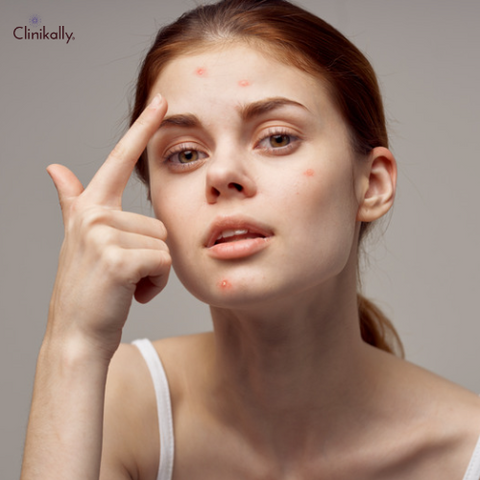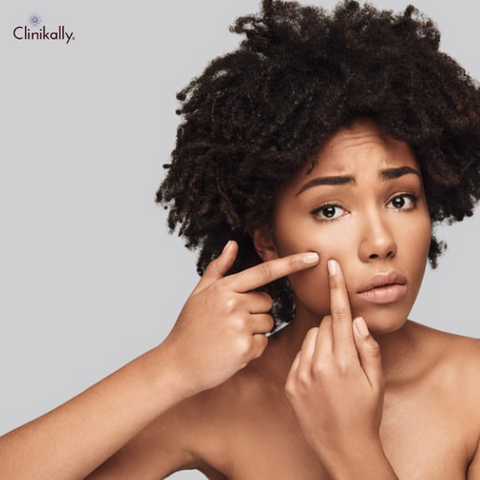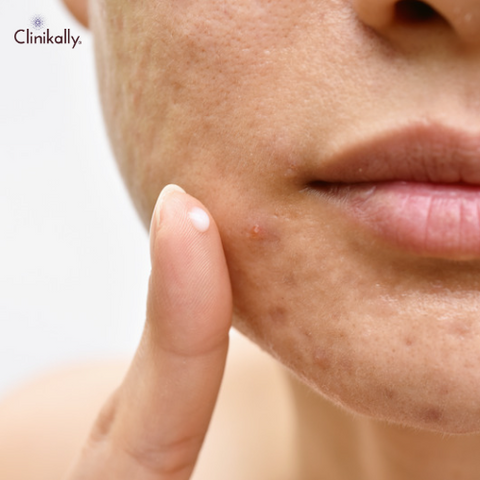Clear skin is a testament to your skincare dedication and the triumph of successfully completing an acne treatment. However, maintaining that newfound clarity is an ongoing commitment. This comprehensive guide aims to navigate you through the journey of clear skin maintenance, post-acne treatment care, and the steps to prevent acne recurrence.
Understanding the Importance of Skincare Maintenance After Acne Treatment

Post-acne treatment, the focus shifts from resolving acne issues to sustaining the treatment's results. It's essential to protect your skin from relapses and further damage, which can be achieved through a regular skincare routine and a healthy lifestyle.
The Role of Post-Acne Treatment Care in Sustaining Clear Skin
-
The aftermath of acne:
Once acne clears up, it does not necessarily mean the end of the skincare journey. Post-acne care plays a critical role in preventing future breakouts and maintaining a healthy complexion.
-
Establishing a skincare routine:
Developing a consistent and tailored skincare routine is essential for sustaining clear skin. This routine should include gentle cleansing, moisturizing, and sun protection. Cleansing helps remove impurities and excess oil, while moisturizing keeps the skin hydrated and balanced. Sun protection is crucial to prevent post-inflammatory hyperpigmentation and protect the skin from UV damage.
-
Treating hyperpigmentation and scarring:
Incorporating products or treatments that target hyperpigmentation, such as topical creams with ingredients like hydroquinone or azelaic acid, can help fade discoloration over time.
-
Managing oil production:
This can be achieved through the use of oil-free or non-comedogenic skincare products. Additionally, individuals may consider incorporating ingredients like salicylic acid or retinoids into their routine, as they help regulate sebum production and prevent clogged pores.
-
Avoiding triggers and maintaining a healthy lifestyle:
Identifying triggers that can exacerbate acne or cause breakouts is crucial for sustaining clear skin. Avoiding these triggers and adopting a healthy lifestyle, including a balanced diet, regular exercise, and stress management techniques, can contribute to long-term skin health.
-
Regular visits to a dermatologist:
Dermatologists can provide valuable insights and guidance on post-acne treatment care, recommend suitable products or treatments, and monitor any recurring or new skin concerns.
Factors Influencing Acne Recurrence and Effective Prevention Strategies
-
Hormonal Imbalances: Hormonal fluctuations, especially during puberty, menstruation, or hormonal disorders, can trigger acne breakouts. Understanding your body's hormonal patterns and seeking professional guidance can help you manage these imbalances and prevent acne from resurfacing.
-
Skincare Routine: Inadequate skin care practices, such as using harsh products or failing to cleanse properly, can lead to clogged pores and subsequent acne flare-ups. Establishing a consistent skincare routine, incorporating gentle cleansers, non-comedogenic products, and regular exfoliation, can significantly reduce the chances of acne recurrence.
-
Diet and Nutrition: Research suggests that certain foods, such as high-glycemic-index carbohydrates and dairy products, may exacerbate acne. Adopting a balanced diet, rich in fruits, vegetables, whole grains, and lean proteins, while minimizing the consumption of processed foods and sugar, can help prevent acne from reappearing.
-
Medications and Cosmetics: Certain medications and cosmetics containing comedogenic ingredients can trigger acne breakouts. Consult with your healthcare provider to discuss acne-friendly alternatives or adjust your medication regimen if necessary. Opting for non-comedogenic, oil-free, and fragrance-free cosmetics can also help prevent acne from recurring.
Essential Skincare Tips for Maintaining Clear and Healthy Skin
-
Cleanse with Care: Proper cleansing is the foundation of any skincare routine. Use a gentle cleanser suited for your skin type to remove dirt, oil, and impurities without stripping away natural moisture. Cleanse your face twice daily, in the morning and before bed, to keep pores clear and prevent breakouts.
-
Exfoliate Regularly: Exfoliation helps remove dead skin cells, unclog pores, and promote cell turnover. Incorporate a mild exfoliant into your routine, such as a chemical exfoliator with alpha or beta hydroxy acids, or a gentle physical scrub. However, avoid over-exfoliating, as it can cause irritation or dryness.
-
Hydrate and Moisturize: Hydration is key to maintaining healthy skin. Choose a moisturizer that suits your skin type and apply it morning and night to replenish moisture and create a protective barrier. Additionally, consider using a hydrating serum or face mist throughout the day to keep your skin hydrated and refreshed.
-
Sun Protection is a Must: Shielding your skin from harmful UV rays is vital in preventing premature aging, sunspots, and other sun-related skin damage. Apply a broad-spectrum sunscreen with an SPF of 30 or higher daily, even on cloudy days, and reapply every two hours when exposed to the sun.
-
Treat Skin Concerns: Address specific skin concerns with targeted treatments. Whether it's acne, hyperpigmentation, or signs of aging, look for products containing active ingredients like salicylic acid, retinol, vitamin C, or niacinamide. However, introduce new products gradually and patch tests to avoid potential irritations.
-
Be Mindful of Your Diet: A balanced diet rich in fruits, vegetables, whole grains, and lean proteins can contribute to healthy skin. Limit your intake of processed foods, refined sugars, and unhealthy fats, as they can trigger inflammation and exacerbate skin issues.
Crafting an Effective Post-Treatment Skincare Routine

A robust post-treatment skincare routine that targets your skin’s specific needs is crucial to maintaining your acne treatment results.
Essential Products and Key Ingredients for Clear Skin Maintenance
-
Gentle Cleanser: A mild, non-stripping cleanser is essential for removing dirt, oil, and impurities without disrupting the skin's natural moisture barrier.
-
Salicylic Acid: This beta hydroxy acid (BHA) is a powerful ingredient for treating and preventing acne. Salicylic acid exfoliates the skin, unclogs pores, and reduces inflammation.
-
Benzoyl Peroxide: It helps to reduce inflammation and clear out clogged pores. Use a benzoyl peroxide spot treatment or a cleanser containing this ingredient to target active breakouts.
-
Retinoids: Retinoids, such as retinol or prescription-strength tretinoin, are derived from vitamin A and are renowned for their ability to improve skin texture, reduce acne, and promote cell turnover. Incorporate a retinoid product into your night-time routine to address acne, fine lines, and uneven skin tone.
-
Niacinamide: This multitasking ingredient offers a range of benefits for clear skin. Niacinamide helps regulate sebum production, reduces redness, minimizes the appearance of pores, and improves overall skin texture. Look for serums or moisturizers containing niacinamide to incorporate it into your routine.
-
Hyaluronic Acid: Hyaluronic acid is a hydrating ingredient that attracts and retains moisture, keeping the skin plump and hydrated. Look for serums or moisturizers that contain hyaluronic acid to boost hydration levels and promote a smooth complexion.
-
Vitamin C: Known for its antioxidant properties, vitamin C helps brighten the skin, fade dark spots, and protect against environmental damage. Incorporate a vitamin C serum into your routine to even out skin tone and enhance radiance.
-
Sunscreen: Protecting your skin from harmful UV rays is crucial for maintaining clear and healthy skin. Choose a broad-spectrum sunscreen with an SPF of 30 or higher and apply it daily, even on cloudy days. Look for lightweight, non-comedogenic formulas that won't clog your pores.
Step-by-Step Guide: Creating a Post-Acne Treatment Skincare Routine
Step 1: Cleanse Gently
Start your routine by cleansing your face with a gentle cleanser twice a day. Look for a mild, non-irritating formula that won't strip away your skin's natural moisture. Avoid harsh cleansers or those containing fragrances that can potentially irritate your healing skin.
Step 2: Hydrate with Lightweight Moisturizer
Apply a lightweight, oil-free moisturizer that suits your skin type. Hydration is essential for maintaining a healthy skin barrier and preventing excessive dryness or oiliness. Opt for non-comedogenic formulas that won't clog your pores. If your skin feels particularly dry or flaky after acne treatment, consider adding a hydrating serum or moisturizer with hyaluronic acid to boost moisture levels.
Step 3: Target Specific Concerns
If you have residual acne scars, hyperpigmentation, or uneven skin texture, incorporate targeted treatments into your routine. Look for products containing ingredients like vitamin C, niacinamide, or retinoids, which can help fade dark spots, promote skin healing, and improve overall skin tone and texture.
Step 4: Sun Protection Is Non-Negotiable
Protect your healing skin from harmful UV rays by applying a broad-spectrum sunscreen with an SPF of 30 or higher. Choose a sunscreen that's non-comedogenic and suitable for your skin type.
Step 5: Eye Care
Don't forget to give your delicate eye area some attention. Apply a hydrating eye cream specifically formulated for the eye area to combat puffiness, dark circles, and fine lines.
Hydration and Moisturization: Nurturing Your Skin's Healing Process
Hydration and moisturization are essential steps in nurturing your skin's healing process, especially after undergoing acne treatment or dealing with skin concerns. By prioritizing proper hydration and using the right moisturizers, you can support your skin's recovery, maintain its health, and achieve a radiant complexion. In this blog section, we'll explore the significance of hydration and moisturization, along with practical tips to help you effectively nurture your skin's healing process.
-
Importance of Hydration:
Hydration plays a vital role in skin health and healing. When your skin is well-hydrated, it maintains a strong and intact barrier function, preventing moisture loss and protecting against external irritants. Proper hydration helps your skin look plump, supple, and youthful. Additionally, hydrated skin is better equipped to repair itself, promoting faster healing of acne scars, redness, and inflammation.
-
Hydrating from Within:
Nurturing your skin's healing process starts with hydrating your body from the inside. Drink an adequate amount of water throughout the day to maintain optimal hydration levels. Aim for at least eight glasses of water, adjusting based on your activity level and climate. Additionally, incorporate hydrating foods such as watermelon, cucumber, berries, and leafy greens into your diet to boost your skin's moisture content.
-
Moisturizers: A Skincare Staple:
Choosing the right moisturizer is crucial for nurturing your skin's healing process. Look for a moisturizer that suits your skin type and addresses your specific concerns. Opt for lightweight, non-comedogenic formulas that won't clog your pores. Ingredients like hyaluronic acid, glycerin, ceramides, and natural oils can help replenish moisture, strengthen the skin barrier, and promote healing.
-
Layering Techniques:
Layering skincare products can enhance hydration and moisturization. Start with a hydrating toner or essence to infuse your skin with moisture. Follow with a serum containing humectants like hyaluronic acid, which attracts and retains water in the skin. Finally, seal in the moisture with a moisturizer to create a protective barrier. Layering products in this manner enhances absorption and maximizes the benefits of each product.
-
Facial Mists and Sheet Masks:
Incorporate facial mists and sheet masks into your skincare routine to provide instant hydration boosts. Facial mists help refresh and hydrate your skin throughout the day, especially when it feels dry or tight. Sheet masks, infused with hydrating serums, deliver concentrated moisture and nourishment to your skin. Use them once or twice a week for an extra hydration boost.
-
Timing Matters:
To optimize hydration and moisturization, apply your skincare products when your skin is slightly damp. After cleansing or using a toner, don't wait too long before applying your moisturizer. This allows your skin to absorb the moisture effectively and locks it in, maximizing hydration benefits.
-
Protect from Environmental Stressors:
Environmental stressors like dry air, pollution, and harsh weather conditions can dehydrate your skin. Protect your skin by using a humidifier in dry environments, wearing appropriate clothing to shield against extreme weather conditions, and using a broad-spectrum sunscreen to guard against UV damage.
-
Consistency is Key:
Consistency is crucial for reaping the full benefits of hydration and moisturization. Establish a skincare routine that includes hydrating and moisturizing steps twice a day. Stick to the routine diligently, even on days when your skin feels fine, as prevention is key to maintaining healthy, well-nourished skin.
Protecting Your Skin: Preventing Breakouts and Acne Scarring

Post-acne care doesn't stop at maintaining clear skin. It also involves pre-emptive measures to prevent new breakouts and handle residual acne marks.
Strategies for Minimizing Breakouts and Pimples After Treatment
After undergoing acne treatment, it's important to implement strategies to minimize the occurrence of breakouts and pimples, ensuring that your skin remains clear and healthy. By adopting these effective strategies, you can maintain the results of your treatment and prevent future acne flare-ups. In this blog section, we'll explore practical tips to help you minimize breakouts and pimples after treatment.
-
Cleanse Regularly:
Maintain a consistent cleansing routine to remove excess oil, dirt, and impurities from your skin. Use a gentle cleanser suited for your skin type and cleanse your face twice a day. Avoid harsh scrubbing, as it can irritate the skin and potentially trigger breakouts. Be mindful of not over-cleansing, as it can strip away the skin's natural oils and lead to rebound oil production.
-
Avoid Touching Your Face:
Touching your face with dirty hands can transfer bacteria and impurities, leading to breakouts. Avoid touching your face unnecessarily and resist the urge to pop or squeeze pimples, as it can cause inflammation and scarring. If you need to touch your face, make sure your hands are clean.
-
Exfoliate Regularly:
Incorporate regular exfoliation into your skincare routine to remove dead skin cells, unclog pores, and prevent the build-up of acne-causing bacteria. Choose a gentle exfoliator suited for your skin type and use it once or twice a week. Avoid harsh scrubbing or over-exfoliating, as it can irritate the skin and exacerbate breakouts.
-
Moisturize Properly:
Even if you have oily or acne-prone skin, it's important to moisturize. Opt for lightweight, oil-free moisturizers that won't clog your pores. Proper moisturization helps maintain the skin's moisture balance and prevents excessive dryness, which can lead to increased oil production and breakouts.
-
Use Non-Comedogenic Products:
When selecting skincare and cosmetic products, opt for non-comedogenic formulas. Non-comedogenic products are specially formulated not to clog pores, reducing the likelihood of breakouts. Check product labels for terms like "non-comedogenic," "oil-free," or "won't clog pores."
-
Mind Your Diet:
While diet alone may not be the sole cause of breakouts, certain foods can potentially trigger acne in some individuals. Pay attention to your diet and observe if certain foods, such as dairy, sugar, or high-glycemic-index foods, worsen your breakouts. Consider reducing your intake of such foods and focus on a balanced diet rich in fruits, vegetables, whole grains, and lean proteins.
-
Manage Stress:
Stress can contribute to hormonal imbalances and trigger breakouts. Practice stress management techniques such as meditation, deep breathing exercises, regular physical activity, or engaging in hobbies that help you relax. Finding healthy ways to manage stress can positively impact your skin health.
-
Regularly Change Pillowcases and Towels:
Pillowcases and towels can harbour bacteria, oil, and dirt, which can transfer to your skin and contribute to breakouts. Change your pillowcases and towels regularly, ideally every few days, to maintain cleanliness and prevent potential acne-causing agents from coming into contact with your skin.
-
Follow Up with Your Dermatologist:
Continue to follow up with your dermatologist even after completing acne treatment. They can monitor your progress, offer further guidance, and make adjustments to your skincare routine if needed. Regular check-ups can help address any emerging concerns promptly.
Treating and Fading Residual Acne Marks and Scarring
With the right products and techniques, it's possible to reduce the appearance of acne scars and hyperpigmentation. Incorporate ingredients like retinoids, vitamin C, and azelaic acid into your routine for their skin-brightening and scar-fading properties.
The Role of Sun Protection in Preserving Clear Skin
Sun exposure can exacerbate acne scars and hyperpigmentation. Thus, a broad-spectrum sunscreen should be a non-negotiable part of your skincare routine.
Nurturing Your Skin from Within: Diet and Lifestyle Considerations
Achieving clear skin is a holistic process that involves more than just topical treatments. Your diet and lifestyle play a significant role in maintaining skin clarity.
Nutritional Habits for Supporting Clear Skin Post-Acne Treatment
A well-balanced diet rich in fruits, vegetables, lean proteins, and whole grains promotes skin health and clarity. Foods high in omega-3 fatty acids, such as fish and walnuts, and antioxidant-rich foods, like berries and leafy greens, can help reduce inflammation and foster a healthy complexion.
The Impact of Stress and Sleep on Skin Health
Stress can trigger hormonal imbalances, leading to acne breakouts. Practicing stress-reducing activities like yoga, meditation, and mindfulness can aid skin health. Additionally, ample sleep is vital for skin repair and rejuvenation, improving overall skin health and clarity.
Incorporating Exercise and Physical Activity into Your Clear Skin Journey
Regular exercise boosts blood circulation, promoting the delivery of nutrients and oxygen to your skin. Just remember to cleanse your skin before and after a workout to prevent sweat and dirt from clogging your pores.
Building a Sustainable Skincare Routine for Lasting Clarity
The secret to maintaining clear skin post-acne treatment lies in consistency and mindfulness about your skincare routine.
The Importance of Consistency in Skincare Maintenance
Consistency is key in skincare. Maintaining a regular routine that caters to your skin's specific needs will ensure your skin stays healthy and clear in the long term.
Choosing Non-Comedogenic Products for Clear Skin
Non-comedogenic skincare products are designed to not clog pores, making them a safe choice for those prone to breakouts. This is particularly important post-acne treatment when the goal is to keep the pores clear and minimize the chances of future breakouts.
Adapting Your Skincare Routine Over Time for Ongoing Results
As your skin heals and changes, so too should your skincare routine. Observing your skin's behaviour and adapting your skincare regimen accordingly will ensure ongoing clarity and health.
In conclusion, maintaining clear skin post-acne treatment involves a multi-faceted approach that includes a tailored skincare routine, a balanced diet, regular exercise, adequate sleep, and stress management. Remember, every skin journey is unique. Be patient with yourself and allow your skin the time it needs to heal and adjust. With perseverance and consistency, you can enjoy the lasting clarity that reflects your skincare commitment.
































